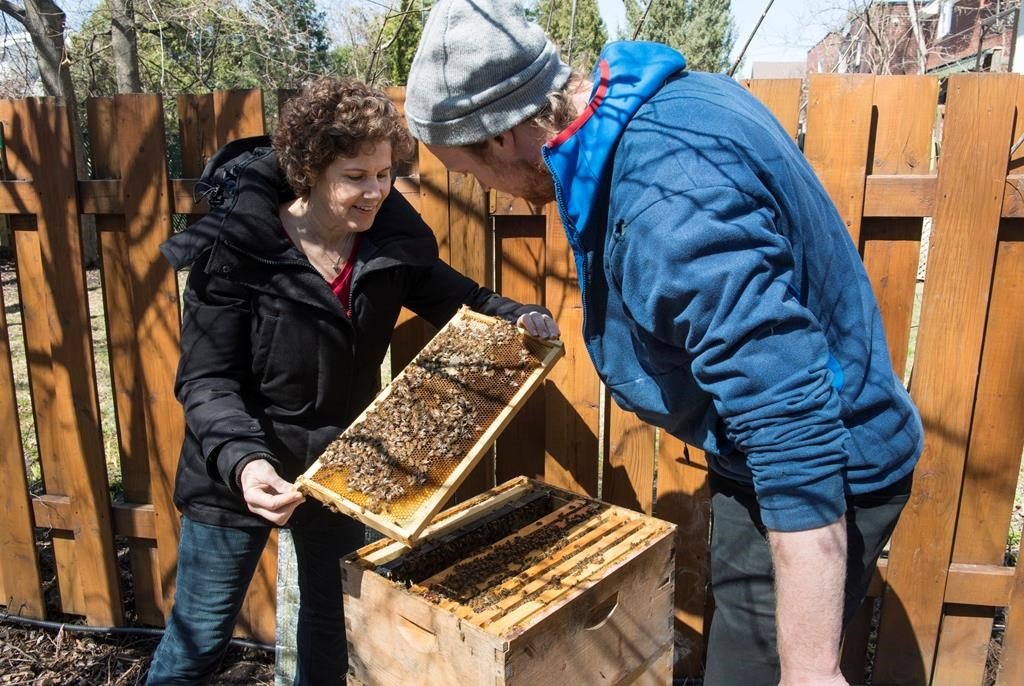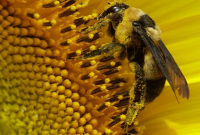Support strong Canadian climate journalism for 2025
Canadian “green” social media is a-buzz about saving the bees, since Health Canada proposed phasing out the largest selling “bee-killing” insecticide, the “neonic” imidacloprid. Click to sign a petition or send a letter saying, “Yes, the sooner the better!”
Wait. Is this actually a victory for science and the environment, or a well-worn strategy to swell corporate coffers? In the world of pharmaceuticals “me-too” drugs abound, and companies (many of which also manufacture pesticides) replace older, cheaper drugs with pricey, new, patented versions.
Health Canada’s proposal leaves untouched several alternative insecticides that are chemically similar, equally toxic, but newer, patented and more expensive. With five other look-alikes available, farmers and consumers of conventionally grown grains, potatoes, fruits and vegetables will pay more, while industry laughs all the way to the bank.
How is this salvation for pollinators or ecosystems?
The Parliamentary Committee on Agriculture and Agri-Food recently branched out from the usual higher-level policy business of Members of Parliament, with hearings focused on the Health Canada administrative decision to phase out this single chemical.
Imidacloprid was the first neonic to be broadly marketed, and the first to be connected with mass bee die-offs in France. International independent scientists, the Task Force on Systemic Pesticides, famously linked neonics to precipitous pollinator declines and threats to food security. Several neonics are partially banned in Europe, and fully banned in France. A joint USA/Canada pollinator study is pending, but the Parliamentary Committee heard that since 2011 Canada has not been self-sufficient in bees. Unlike previously, now every year, packets containing queens must be imported.
Neonics also harm worms, fish, birds, mammals and other species, with effects that ripple up the food chain. Health Canada’s Pest Management Regulatory Agency (PMRA) found that high levels of imidacloprid in waterways undermine the base of the aquatic food chain, so imidacloprid is proposed to be phased-out over three to five years.
Neonics and breakdown products permeate the entire plant and can persist for years in soil, so we eat them in our food.
Various neonics can break down into the same toxic metabolites, so if one is banned, others should be too. We know enough to banish all six from the fields.
In a stark contrast to the industry’s defence to parliamentarians of the supposed economic benefits of these long-lasting chemicals that kill a broad range of creatures, during the hearings two new reports from the United Nations and the European Parliament revealed that intensive pesticide use has actually not increased yields or farmers’ profits over the long term.
Their conclusion: organic farming is the answer to feeding the world.
Équiterre’s Annie Bérubé described Quebec’s outstanding support for organic agriculture, a model to be emulated nationally. Organic farmers need a broad ban to protect pollinators and other beneficial creatures, including bio-controls for crop pests. Indeed, all farmers share this need. In recent field trials, imidacloprid decreased soy bean yield because it killed a slug-eating beetle.
Canada needs a 21st century, least-toxic approach to pest control. It’s time to end the parade of permitted toxicants that are eventually shunted off the shelves only after environmental and economic damage escalates to harmful levels.
Pesticides risk our health, and the ecosystems that cradle us all. Quebec is changing course, but Prevent Cancer Now hears of antagonism and lack of support faced by Canadian organic farmers elsewhere.
In stepping out of their usual role, the Members of Parliament on the Agriculture Committee have cracked open the door to charting new strategies for environmental and human health, and for sustainable agriculture in a changing climate. Let’s hope that they step through that door.
Comments on the proposed imidacloprid phase-out are due to the PMRA by March 23rd.
- Meg Sears PhD is an Ottawa-based scientist, and Chair of Prevent Cancer Now.






Comments